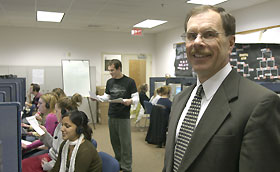|
This is an archived article. For the latest news, go to the Advance Homepage
For more archives, go to the Advance Archive/Search Page. |
||
|
Annual Giving Key Component
Phone calls from telemarketers can be annoying. But Ken Goebel, the UConn Foundation's assistant vice president for special and annual giving, hopes that when the phone does ring, members of the University community will hear the caller out. That's because the friendly voice at the other end of the line might be one of his student workers seeking donations to the University.
The student phonathon is one of the programs under Goebel's direction that solicit contributions to the Annual Fund, along with direct-mail, reunion gift campaigns, e-solicitations and online giving, and a growing volunteer program. Together, these various efforts are expected to raise $2.5 million this year from 40,000 donors, many of them alumni and parents of current students. Goebel, who joined the Foundation in January after managing the University of Pennsylvania's Penn Fund for two years, feels that part of his job is to educate donors about the importance of annual giving to the overall success of Campaign UConn, the University's six-year, $300 million fund-raising campaign. "When someone makes a gift to the endowment, the spending allocation is a percentage of the return on the principal's investment, whereas a $1,000 annual gift, for example, is immediately spendable on priorities and opportunities that arise," he says. "The University needs both types of gifts, because they represent short-term and long-term strategies." The President's Fund, various Dean's Funds, and the Parents' Fund are some of the appeals scheduled throughout the year. These funds are pools of unrestricted money available to the President, deans, and the Foundation to apply where the need is greatest. If a donor requests, gifts may be designated for specific purposes - such as a particular scholarship or program - through the Annual Fund. These are known as restricted gifts. Every gift is credited to Campaign UConn's total. "With an annual giving program, it's important to encourage regular and repeatable gifts over consecutive years," Goebel says. "Staying in touch with donors from year to year is key." The phonathon is the single biggest component of the Annual Fund, accounting for more than 40 percent of the $2.25 million raised in Fiscal Year 2003. Currently, it employs 130 student workers who, during their evening shifts, use the phones and their personal powers of persuasion to convince donors that every gift enhances UConn's margin of excellence. The Annual Fund also involves a strong volunteer effort in support of special campaigns and class giving opportunities, such as the current Class of 1954 50th reunion gift appeal to build a quiet study room at the Homer Babbidge Library. Volunteers play an important role in both programmatic and fund-raising activities. The Health Center's annual giving program is also being developed, under the direction of Roslyn Reaback, director of special and annual giving, who was hired last year. The Health Center effort seeks primarily to raise funds from faculty, staff, and alumni of the medical and dental schools, as well as grateful patients and other friends, to support a number of key initiatives. "This is a relatively young program," says Reaback. "But so far the response from our constituents has been highly positive. It has also helped to make people aware of the various aspects of the Health Center, from the signature programs in the School of Medicine to the School of Dental Medicine, our graduate programs in Public Health and Biomedical Science, and the John Dempsey Hospital itself." One of Goebel's next goals is to work closely with the Alumni Association to engage recent UConn graduates, so they remain connected to the University and come to understand the crucial role they play as sources of future financial support. Planning is underway for a new GOLD (Graduates Of the Last Decade) program to provide special recognition for donors in this group and highlight the need for private support at the University. "We want to show young graduates starting out in their careers that it doesn't take a lot of money for them to have an impact at UConn. After that, it becomes a more comfortable routine that can build up incrementally over the years," says Goebel. "I am really looking forward to the challenges of building the program." |

